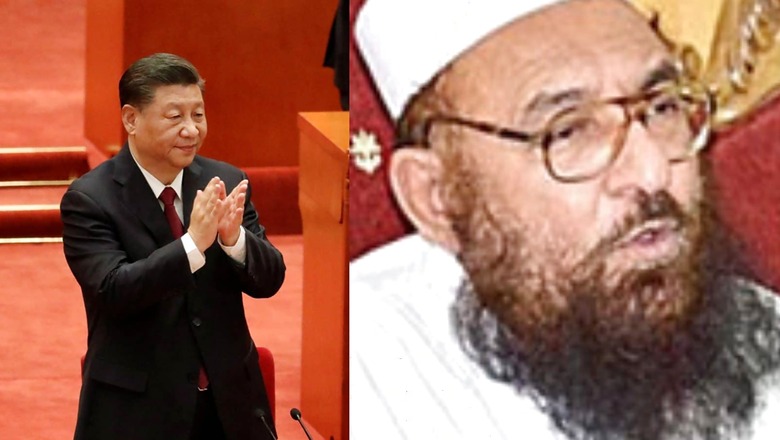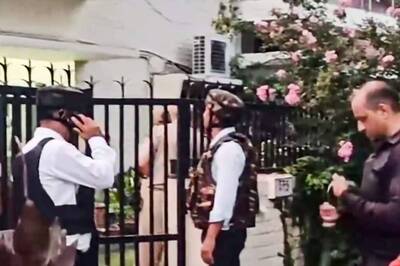
views
As China blocks the joint proposal by the US and Indian governments to designate Abdul Rehman Makki, a US-designated terrorist and brother-in-law of Lashkar-e-Taiba (LeT) chief Hafiz Saeed, as a global terrorist on June 16, 2022, based on a ‘technical hold’ under United Nations Security Council 1267 Committee, a larger question arises over how to deal with the issue of terrorism in South Asia — a concern for the entire humanity – tackle countries like Afghanistan and Pakistan, which are considered safe haven for terrorist groups.
This proposal was tabled jointly by India and US at the Security Council Meeting. Beijing’s decision is extremely unfortunate and against the interest of counter-terrorism. China had repeatedly blocked the designation of Jaish-e-Mohammad’s chief Masood Azhar until 2019 and others before this. There is a pile of evidence against Abdul Makki that he is part of command and control of United Nations Security Council designated terrorist organisation LeT and later named Jamaat-ud-Dawa (JuD), which is also a United Nations Security Council designated terrorist organisation.
India believes that Makki is responsible for the Red Fort attack in 2000 and recent attacks in Jammu and Kashmir. He is designated as a terrorist under India’s Unlawful Activities (Prevention) Act and the US’ Designed Global Terrorist with a $2 million reward for information that would convict him. China’s action to defend Makki and previous designations that it blocked as ‘technical objections’ based on some procedural loopholes are based upon the pattern of clearly protecting Pakistan internationally. Since 2008, Pakistan-based terrorists such as Zaki-ur-Rehman Lakhvi (2008), Hafiz Sayeed (2009), and Masood Azhar (2019) have been defended in the United Nations Security Council 1267 committee such as These terrorists are accused of attacking India on several occasions. In this light, questions, which arise are: What exactly is this UNSC 1267 Committee under which China has blocked the US and India’s proposal and what is its significance, what lies ahead for the region of South Asia in dealing with terrorism vis-à-vis for India?
Before understanding the UNSC 1267 mechanism, it is important to highlight some of the ways in which the terrorist organisation’s function. The LeT or JuD, to whom Makki belongs, is responsible for committing several attacks in India including the 26/11 attack in Mumbai. Such terrorist organisations recruit foreign terrorist fighters who are individuals and travel to a state other than their state of residence or nationality for the purpose of perpetrating, planning, preparing, and participating in terrorist acts or providing or receiving terrorist training.
It is in this context that the UNSC 1267 regime that came into existence in 1999 consisting of a consolidated list of individuals and entities associated with Al Qaida and Taliban holds significance. The 1267 regime along with UNSC resolution 1373 that was implemented in the aftermath of the 9/11 attack forms the bedrock of fight against terrorism as a global effort. It consists of the smart sanctions regime and blacklisting mechanisms for targeted individuals. The implementation of such measures to address security threats forms part of the measures under Chapter VII of the UN Charter that deals with Action with Respect to Threat to Peace, Breach of Peace, and Acts of Aggression.
What needs to be understood is how these individuals are listed as global terrorists under the UNSC 1267. In simple terms, any individual who participates in the financing, planning, facilitating, preparing, or perpetrating of acts or act, in conjunction with, under the name of, on behalf of, or in support of the Taliban, al-Qaida, and its leader is listed under the 1267 regime. The purposes for which these measures are being utilised include identifying co-conspirators, facilitators, and supporters. However, the implementation of such measures is surrounded by difficulties ranging from lack of awareness, lack of coordination and related issues.
The need of the hour, both at the international and South Asian levels that is marred by ethnic conflicts, religious fundamentalism, and intense political polarisation, is to adopt a common strategic vision to emphasise secular tolerance and moderation in which India must play its part by preparing a case for cross-border terrorism before the international community. Although there exists South Asian Association for Regional Cooperation Convention on Terrorism but genuine cooperation among countries is missing. Such cooperation must also include the private sector and the civil society with an aim to secure the borders, disrupt terrorist financing and restrict terrorist movements.
Abhinav Mehrotra is Assistant Professor Dr. Biswanath Gupta is Associate Professor at OP Jindal Global University. The views expressed in this article are those of the authors and do not represent the stand of this publication.
Read all the Latest News and Breaking News here

















Comments
0 comment